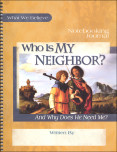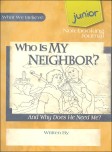We use cookies to make your experience better. To comply with the new e-Privacy directive, we need to ask for your consent to set the cookies. Learn more.
The statistics are disturbing. Teens and young adults who have been raised in the church are leaving and not returning later. Lots of them! Europe is filled with empty church buildings. Is America following her example? Researchers trying to find the reasons have concluded that it isn't enough to "just" take your child to church with you. It isn't enough to "just" homeschool. Parents must be actively involved in living/demonstrating/teaching the biblical Christian worldview. Worldview isn't something mystical or unknowable - it's simply the way your child (and you) looks at the world every day. Diverse beliefs about reality fill the world around us and in our emerging "global village" are coming ever closer. Christians are faced with critical questions such as: "How do we know what is true?" and "How must we live our lives in relation to the truth we come to know?" This curriculum (ultimately a four-part series) is designed to address questions like these. It is based on the biblical Christian worldview, which affirms that truth is absolute and knowable through the revelation of God. It reiterates that knowledge of God is the beginning of wisdom and the key to understanding the world around us.
Apologia is providing a wonderful tool for Christian parents: user-friendly, colorful texts written in an engaging, conversational style directly to the student. A tool that can be customized to any individual child or family, encouraging Bible reading and memory work, thoughtful examination and consideration of ideas, notebooking as a means of gathering and processing information, prayer and personal application. It is both a Bible study and a doctrinal study; but it is much more. It presents students with the opportunity and necessity of turning the light inward and then turning toward the One who is the Light. As such it does not hesitate to take on some difficult questions such as: Where am I building my life? What is God like? If God created the world, why isn't it perfect? Why did God create me?
Although this series is unique in many ways, there are also many points of overlap with the worldview materials that come from Summit Ministries - indeed, one of the writers is a Summit staff writer. That's good, in my opinion, as Summit Ministries has been actively pursuing the idea of worldview education for years and has developed an orderly approach to its many facets. It also means that you can expect to see a thorough and age/grade appropriate examination of all the major worldviews as well as the implications of each on different aspects of our culture.
To give you an idea how all of this works together within a lesson, let's look at lesson 6 of Who is God? (V1): "If God Created the World, Why Isn't It Perfect?" The authors obviously understand about how to "hook" an audience because the first thing you notice as you skim through the lesson is a story about a camping trip, a recipe for S'mores Clusters (yes, they sound wonderful), and a picture of a wide screen TV. Well, the camping story introduces a father-son discussion on creation while the rest of the chapter provides the biblical and theological background - The Four Relationships of Creation. And the TV? It serves as a reminder that TV shows, movies, music and internet sites are all produced by people with worldviews and that they are powerful tools that can shape what we believe.
Each Text is a beautifully done hardcover book that includes the lessons for each course. Each lesson can be covered in about two weeks, three days per week. That timetable would probably work well for a middle school student working more or less independently. However, there's a lot of flexibility here and if you wanted to do the study as a family with multi-age children it could be slowed down considerably. Lessons follow a pattern: an overview called The Big Idea, a list of the learning objectives - What You Will Do, a short story, then Think About It (thought-provoking questions). Next is a vocabulary study - Words You Need to Know - and suggested Bible memory verses - Hide It in Your Heart. (Bible verses are primarily taken from the NIV although the ICB and NLT are sometimes used. Students are encouraged to read passages in whatever version they prefer.) The heart (and bulk) of the lesson is called "Integrated Learning" and consists of a clear presentation of the lesson contents interspersed with interesting articles (e.g. Where was the Garden of Eden? in Lesson 6, V1), biographical sketches (e.g. Fanny Crosby), illustrative artwork (often reproductions of masterpieces by Rembrandt, Velazquez, Dore, Michelangelo, and others), and Make a Note of It sections (suggestions for notebooking topics). Personal application is introduced in the What Should I Do? section along with a prayer. Each lesson concludes with Worldview in Focus - which is an ongoing study using a visual model - The House of Truth - developed by Summit Ministries.
Apologia has given us a valuable course of study. I have to admit it's courses like these that make me wish I could start my homeschooling all over again. How blessed today's generation of homeschoolers are! Although the course could be completed with just the Text, a Bible and a notebook for each child, Apologia has prepared some additional user-friendly tools. Designed to be a keepsake record of the child's spiritual growth through each course, the Notebooking Journals provide subtly colored, graphically designed (i.e. attractive and appealing) space to keep notes from the course content, vocabulary, memory verse records, reinforcing activities and mini-books, practical applications, course reviews and thoughtful responses. These are probably most appropriate for upper elementary and middle school students as there is a fair amount of writing involved. The student is the author of this journal and a nice feature is the author's biographical page at the end - all ready for the student to supply his information. [May I just add a "Wow!" here - these journals are amazingly and lovingly prepared.] The Coloring Books may appeal more to the younger set but there's enough detail to bring out the artist in anyone. The to-be-colored pictures serve as review and reinforcement; sometimes depicting characters from Bible stories or biographical sketches and sometimes asking a question of personal application. You'll want a set of high quality colored pencils like Prismacolor Scholars. The MP3 Audio CDs provide course content that can be downloaded to computers or iDevices. ~ Janice
























